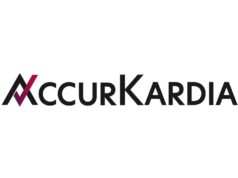 HeartBeam has announced that the US Food and Drug Administration (FDA) has granted 510(k) clearance of the HeartBeam system for comprehensive arrhythmia assessment. A press release from the company details that, with its patented design, the HeartBeam device is the first of its kind to receive FDA clearance.
HeartBeam has announced that the US Food and Drug Administration (FDA) has granted 510(k) clearance of the HeartBeam system for comprehensive arrhythmia assessment. A press release from the company details that, with its patented design, the HeartBeam device is the first of its kind to receive FDA clearance.
“It’s well documented that patients who delay seeking care for their cardiac symptoms face worse clinical outcomes. The ability for patients to capture high-fidelity ECG [electrocardiogram] signals from three directions, wherever they are, when symptoms occur will help patients get the care they need in a timelier manner,” said Robert Eno, chief executive officer (CEO) of HeartBeam. “The FDA clearance of our technology is a significant milestone for the company that brings us one step closer to fulfilling our vision of providing unprecedented cardiac insights to individuals and physicians.”
As a high-fidelity ECG system with a credit card-sized form factor and cable-free design, the HeartBeam device captures heart signals from three distinct directions for actionable heart health information.
When a patient feels symptoms, the HeartBeam app guides them through the process of placing the device on their chest and capturing a 30-second recording. Once a recording is taken, the signals are sent to the cloud, processed, and sent to a physician for review. The physician reviews the ECG recording in the context of the patient’s symptoms and medical history, then follows up with the patient on next steps.
HeartBeam plans to initiate an early access programme, and is creating a waitlist of interested patients and physicians.
The release further notes that FDA clearance is “foundational”, and will serve as the basis for future submissions as the company attempts to simplify the access of intelligent and actionable 12-lead ECGs for both patients and physicians. Future planned advances include:
- Synthesised 12-lead ECG—the HeartBeam system is designed to be capable of synthesising the heart’s signals collected from three directions into a 12-lead ECG using a personalised transformation matrix, as demonstrated in a pilot study
- Artificial intelligence (AI)-based classification algorithms—data presented earlier this year demonstrated that HeartBeam’s deep learning algorithm has the potential to greatly improve the detection of atrial flutter, even outperforming cardiologists in detecting some arrhythmias, the company claims
- Heart attack detection—a study published in JACC: Advances has shown that HeartBeam’s ambulatory technology is comparable to a standard 12-lead ECG in identifying coronary occlusions and is highly accurate (area under the curve of 95%), while another feasibility study has highlighted the potential of the technology to calculate a heart attack risk score to assess chest pain remotely.









